Every Trent Reznor and Atticus Ross Score, Ranked
- Oops!Something went wrong.Please try again later.
- Oops!Something went wrong.Please try again later.
- Oops!Something went wrong.Please try again later.
- Oops!Something went wrong.Please try again later.
- Oops!Something went wrong.Please try again later.
Trent Reznor and Atticus Ross have, in less than 15 years, established themselves as the most exciting composers working in contemporary film.
Their first score was David Fincher’s masterpiece “The Social Network.” The score was a haunting, atmospheric triumph, and it won them Oscars, an even more impressive feat given the Academy’s historic anti-rock band bias. (Reznor created and fronts Nine Inch Nails; Ross officially joined the group in 2016, although they had been close creative partners since 2002.) And what began as an exclusive collaboration with Fincher soon blossomed outward – they have worked with Pixar and Ken Burns, scored a prestige TV version of Alan Moore’s “Watchmen,” and an animated “Teenage Mutant Ninja Turtles” movie. They can do it all, while remaining uniquely them.
They are unstoppable, too. This week “Challengers,” from Luca Guadagnino, is released alongside their soundtrack album. And they have a pair of scores still coming this year – for the big-budget Apple movie “The Gorge” and for Guadagnino’s “Queer,” starring Daniel Craig.
For the purposes of this list, we are only including scores that they worked on together, for the entirety of the project – they worked on “Before the Flood,” but in conjunction with Mogwai and Gustavo Santaolalla, who worked on certain tracks and who are credited as co-composers.
Likewise Reznor’s early work, like the videogame “Quake” and bits of “Natural Born Killers” and “Lost Highway” also do not count, although here’s the video for “The Perfect Drug” from “Lost Highway” because the song rules and it’s one of the best music videos of all time:
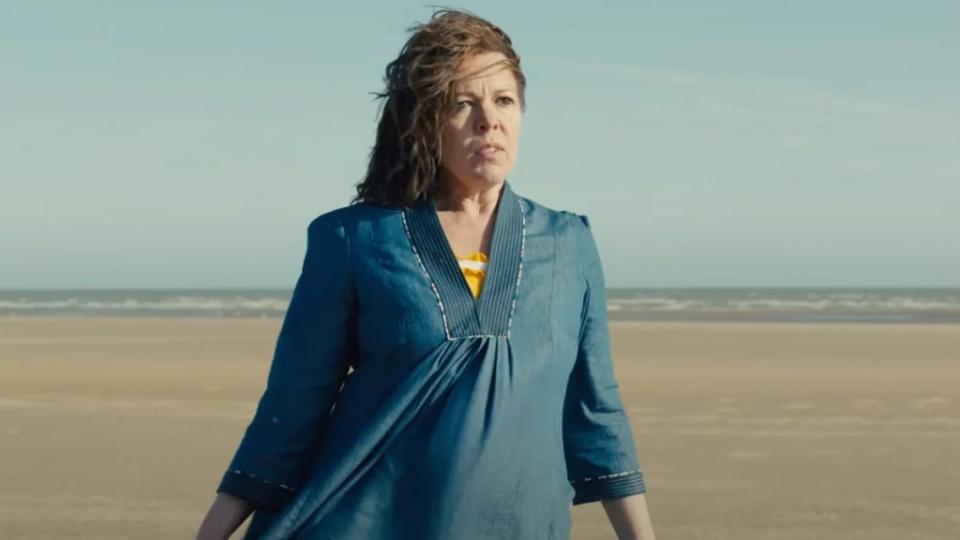
16. “Empire of Light” (2022)
It’s unclear why, exactly, Sam Mendes thought of Reznor and Ross for his delicate, autobiographical ode to small English seaside towns and the twinkly magic of moviegoing. The pair were brought in while Mendes was working on the script; he also asked them to provide four hours of music, even though the movie is only 115 minutes long, which seems like a weird power move more than anything else. (The official soundtrack is less than an hour.)
From all that experimentation, a relatively simple score was concocted, built around melodies Reznor played on the piano. If you thought that the movie’s 1980 setting would have allowed them to play around with vintage synths and other, more period-specific instrumentation, you’d be wrong! Their score for “Empire of Light” isn’t bad, exactly, but it is forgettable. Which might be worse.
Essential track: “Nothing Happens Without Light“
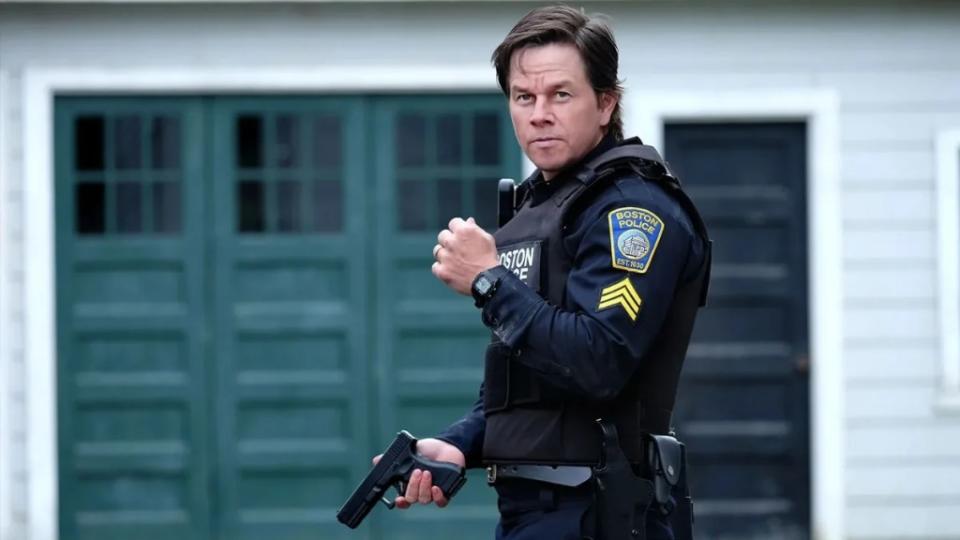
15. “Patriots Day” (2016)
For their first non-David Fincher feature film score, they veered wildly, to Peter Berg’s Mark Wahlberg-led Boston Marathon bombing thriller. “What lured us in was the challenge of seeing if we could try to color outside the lines a little bit of what music might be expected to do in a picture like that,” Reznor said at the time. They approached the movie like a procedural rather than a based-on-a-true-story drama, and the composers were granted access to “this FBI Dropbox” (as Ross called it) full of stuff from the actual bombing.
The resulting score is certainly different than you’d expect it to be, leaning into a kind of uneasy ominousness over something more propulsive or drum-filled. (There are cues like “Escape” that are absolutely nerve-shredding.) As always, they do exceptional work, which was oftentimes lost in the mix of the actual, oddly forgettable movie.
Essential track: “We Forget Who We Are“
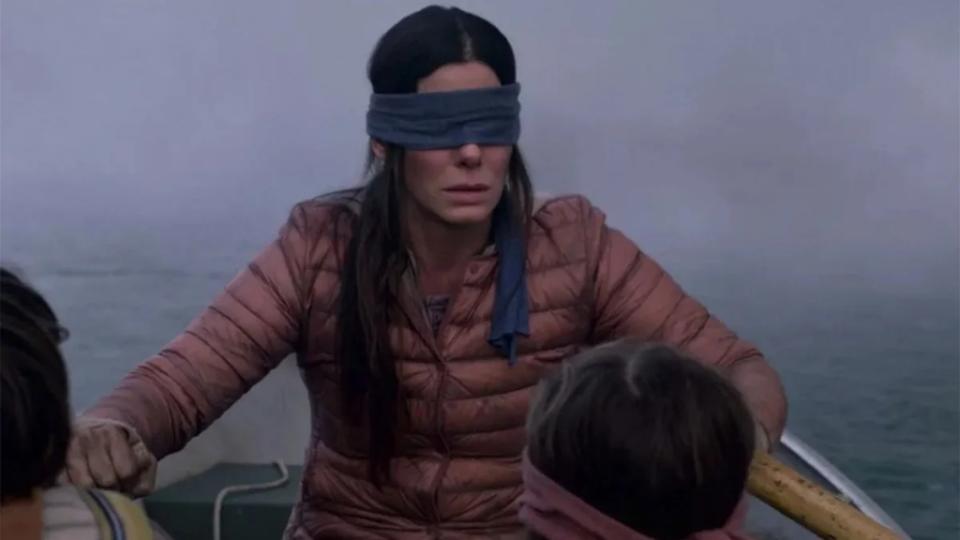
14. “Bird Box” (2018)
“Bird Box” was not the best experience for Reznor and Ross. Shortly after the movie was released, they released a much longer version of the soundtrack via the Nine Inch Nails website, eventually putting even more music out via an extended vinyl box set. They were diplomatic at the time, presenting the music as something more than what they probably heard in the actual movie. A year later, in an interview with Revolver, Reznor was more open, saying that the editor had extremely bad taste and that they were on tour when the film was mixed (“They mixed the music so low, you couldn’t hear it anyway”). He called it ”a f–ing waste of time” and thought nobody would watch the movie, which, of course, then became a huge hit for Netflix. And while it’s harder to track down the longer versions of the score now (most digital platforms simply have the “abridged” version), there’s a lot to move about the music, which is way creepier and more foreboding than the movie was. The unseen evil of “Bird Box” is beautifully personified by the electronic squelching and throbbing synths of the score. Track down the longer version for even more unheard excellence.
Essential track: “What Isn’t Anymore”
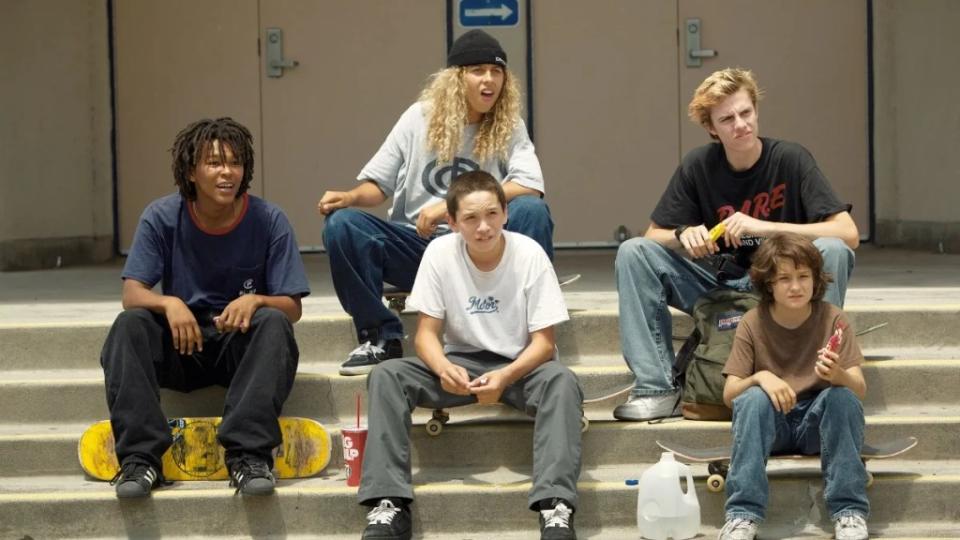
13. “Mid90s”
“Mid90s” director Jonah Hill told Howard Stern that he was inspired by what Reznor and Ross’ “perverse take on warmth would be.” After screening the film for them, the duo agreed to work – but they were deep in Nine Inch Nails territory at the time and were touring, only communicating with Hill through Skype (hey, it was 2018), calls and texts. (According to Hill, they once apologized for background noise because they were recording backstage at the Royal Albert Hall before a show.)
While they only wound up recording around 12 minutes of material for the movie, a coming-of-age film set in the titular time period, it really is warm and inviting, occasionally tipping into Brian Eno-y ambient loveliness. (The rest of the soundtrack is era-appropriate cuts by Nirvana, The Pharcyde, the Pixies, and more.) It was proof that, while they were known for their chilly electronic compositions, some piano work and guitar, with computerized embroidery, can be just as powerful. One of the more underrated accomplishments in their oeuvre.
Essential track: “Finding a Place“
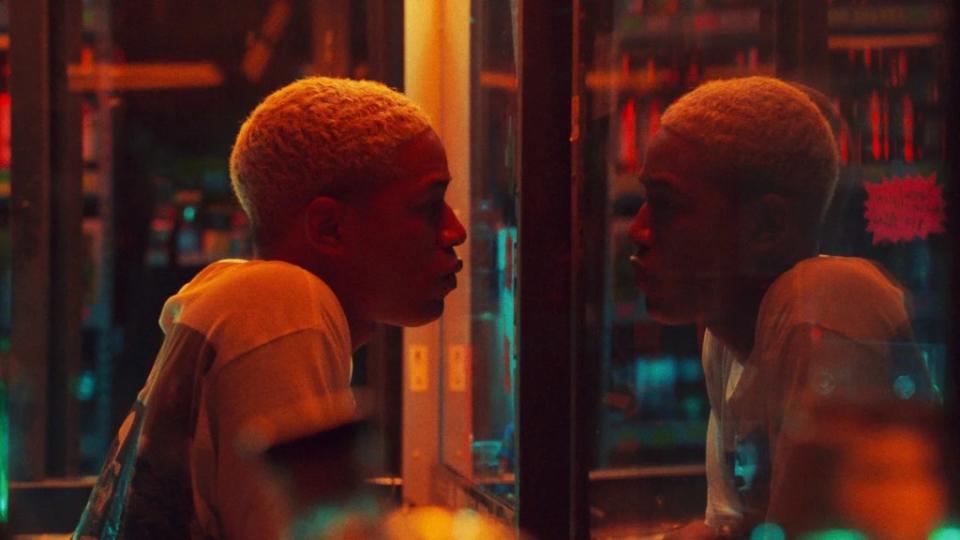
12. “Waves” (2019)
Initially, “Waves” was described by its writer/director Trey Edward Shults as a musical, which made the hiring of Reznor and Ross even more exciting. This turned out to not be the case, with Shults walking back the comments and saying that the way he used songs was inspired by musicals. (Tame Impala, Frank Ocean, Radiohead and Kanye West songs show up in the film.) Shults said he got an email from Reznor and Ross telling him how much they liked his earlier movies; he then sent them the script for “Waves” and were immediately on board.
They recorded and released more than an hour of music for the film, which is definitely them at their most playful and experimental, sometimes merely suggesting the idea for a cue and other times engaging in big musical set pieces (there’s a single cue on the album that lasts for more than 22 minutes). It’s incredibly ethereal and moving, serving as the emotional throughline for a movie that has some extreme ups and downs. (If you never saw it, it’s incredible.) This is the kind of score that they seem happy to do even if it isn’t the flashiest or most in-your-face. It sneaks up on you.
Essential track: “After the Fire”
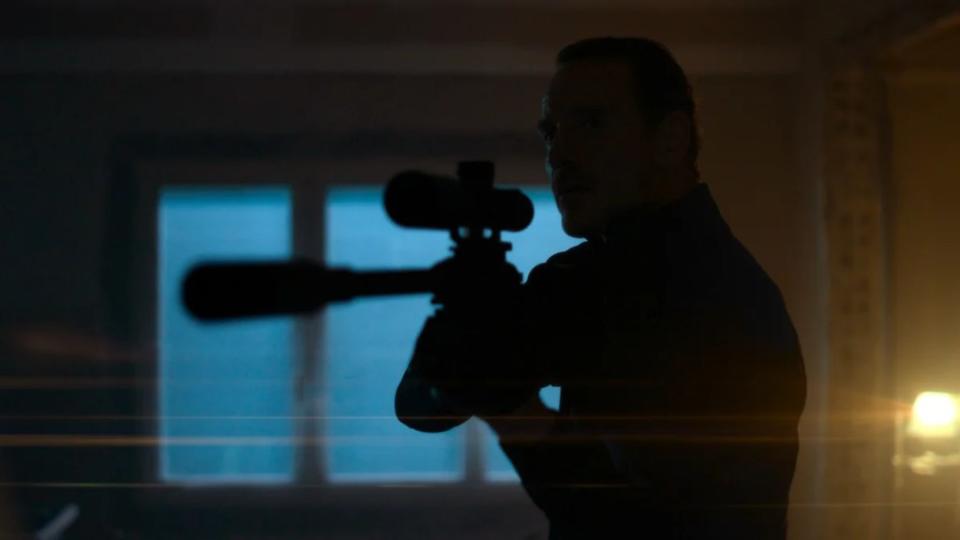
11. “The Killer” (2023)
Last year, Reznor and Ross reteamed with David Fincher for “The Killer,” a lean, mean thriller starring Michael Fassbender as an assassin who sets out on an international quest for revenge. Further blurring the line between sound design and score, Reznor and Ross’ music sometimes takes on the feeling of an electronic heartbeat monitor or maybe a piece of machinery that’s on the fritz and, therefore, unpredictable. There is dread and the live-wire threat of coiled violence in every note. It’s a remarkable score, somewhat underrated due to how subtle it is, but they still get to shine. In particular, during the piece of music that accompanies the opening title sequence, which features various murder weapons and, among other things, a dead baby.
They also composed an unbelievable piece of music that accompanied the movie’s first trailer, which is thankfully included in the soundtrack album. (Also incredible: that their cues didn’t bump up against the soundtrack’s Morrissey songs but felt cohesive.) Reznor and Ross’ partnership with Fincher is one of the great composers/filmmaker collaborations of all time. “The Killer” just reinforced that.
Essential track: “The Killer“

10. “Mank” (2020)
Talk about being really outside of their comfort zone. Not only were Reznor and Ross tasked with coming up with a traditional orchestral score appropriate for “Mank’s” 1940 setting, but they were doing it at the height of the pandemic, so every individual musician had to record their bits in their homes and send them to Reznor and Ross for reconfiguration. There must have at least been some comfort in returning to the David Fincher fold. “The music has been recorded with older microphones so it has a sort of sizzle and wheeze around the edges — you get it from strings, but you mostly get it from brass,” Fincher said at the time. Reznor also admitted to playing “Citizen Kane” while working on the music “just to be reminded of what music did in there.”
While it’s fascinating to think of what a movie set in 1940 would have sounded like punctuated by Nine Inch Nails-style synths (probably something akin to what Cliff Martinez did for “The Knick”), the score that we ended up with is absolutely ravishing – sometimes the music takes on the cadence of a typewriter being furiously written on; other times it’s more melodic, almost heavenly; and there are still other moments when it morphs into something jazzier, more swinging. You can also really dive deep on the music; Reznor and Ross have released extended versions of the soundtrack that include early demos and other ephemera. (They also released merchandise featuring an old-timey version of their record label’s logo.) It’s all part of the singularly immersive experience of a Reznor/Ross score.
Essential track: “Scenes from Election Night“
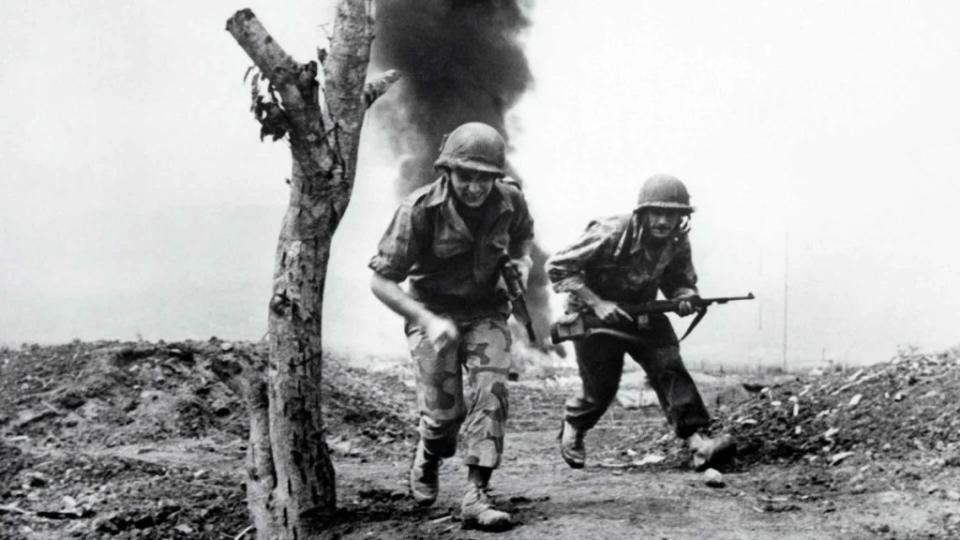
9. “The Vietnam War” (2017)
Of course, Ken Burns and Lynn Novick’s sprawling PBS documentary had all of the era-appropriate needle drops you’d probably expect (Buffalo Springfield’s “For What It’s Worth,” Pete Seeger’s “Waist Down in the Big Muddy,” etc.). But what was unexpected was his recruitment of Reznor and Ross to create new music for the series, while also utilizing tracks from “The Social Network,” “The Girl with the Dragon Tattoo,” the “Ghosts” project, and even instrumental versions of Nine Inch Nails songs from “The Fragile” and “Year Zero.” Who knew Burns was such a NIN head?
The new music that Reznor and Ross composed, over 90 minutes of it, is deeply unnerving and really haunting, oscillating between the kind of horror of the situation and the ghastly realization of what was actually happening overseas. Sometimes, the score is reduced down to a spare piano riff, while other times, Reznor and Ross unload the full fury of what they are capable of, jammed with screaming synths and bleating beats, emphasizing the disorientation and rage that largely defined the conflict. It’s an amazing piece of work, largely overshadowed by some of their more mainstream projects, but just as singularly powerful and memorable.
Essential track: “Justified Response“
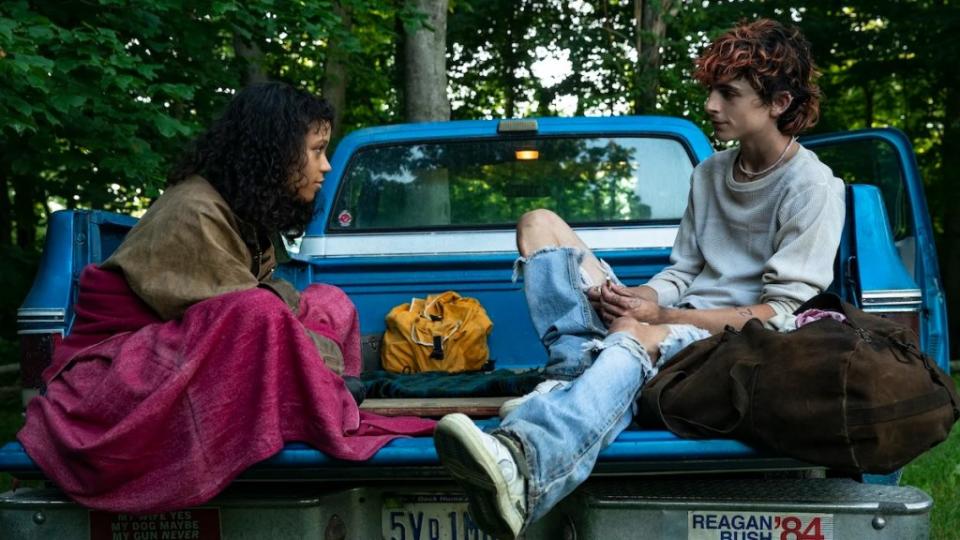
8. “Bones and All” (2022)
Reznor and Ross’ first collaboration with Luca Guadagnino was for his 1980s-set cannibal love story/road trip movie “Bones and All,” in which the filmmaker insisted that the musicians lean into the homespun Americana of the story. “He would say things like, ‘The score needs to be terminal and melodic and timeless,’” Reznor told The Wrap at the time. “‘A melancholic elegy, an unending longing. It needs to be a character in the film, a part of the landscape.’” They used acoustic guitars and other stripped-down instrumentation, relying on their usual electronic flourishes sparingly (if at all).
It’s gorgeous, haunting, atmospheric, conveying the loneliness of the characters and also of the countryside, a place that was being ravaged by governmental policy and corporate thoughtlessness. And what’s more, the filmmaker got a really-for-real Nine Inch Nails song out of the duo with the heartbreaking “(You Make Me Feel Like) Home,” which plays at the end of the movie. Reznor had intended for somebody else to do the vocals, but was eventually convinced by Guadagnino to do it himself. As always, the filmmaker was right. You try keeping it together when Reznor sings: “For a minute … just a minute … we made it feel like home.”
Essential track: “(You Made It Feel Like) Home“

7. “The Girl with the Dragon Tattoo” (2011)
For David Fincher’s adaptation of “The Girl with the Dragon Tattoo,” which was, incredibly, released a little more than a year after “The Social Network” opened, the filmmaker gave Reznor and Ross a very specific set of directions. “David wanted Sweden and the cold to be a character in the film and we should explore that – what sounds cold? A lot of digital synths and digital ways of presenting sound tends, in our opinion, to feel icier and less comfortable,” Reznor recently told GQ. The duo was also experimenting with the score as sound design, with Ross pointing out that they utilized the noise from an industrial floor cleaner and used it in the background of a particularly foreboding sequence.
Their music also gets to take center stage in some lovely ways – during an extended flashback sequence narrated by Christopher Plummer, in a high-speed chase towards the end of the movie and in an extended sequence where our charming hero hacker (Rooney Mara) gets revenge in the sleekest, most Fincherian way possible. It’s also worth noting that Reznor and Ross worked on a pair of cover songs – the opening credits sequence comes equipped with a cover of Led Zepplin’s “Immigrant Song” (it was also used quite memorably in the first trailer for the movie), while the closing credits had Reznor and Ross collaborating with Reznor’s wife Mariqueen Maandig, on a cover of “Is Your Love Strong Enough?,” the Bryan Ferry song from the “Legend” soundtrack. As bookends to a tremendous piece of work, they are utterly captivating.
Essential track: “Infiltrator”
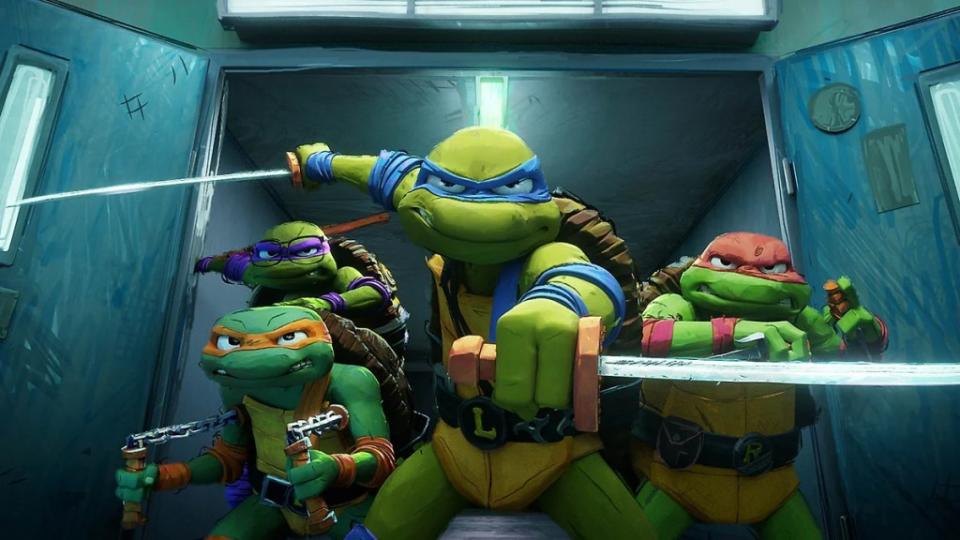
6. “Teenage Mutant Ninja Turtles: Mutant Mayhem” (2023)
Yes, Reznor and Ross really did the music for the recent animated “Teenage Mutant Ninja Turtles,” a project that, in every way, emphasized the teenage aspect of the title. To that end, Reznor and Ross, impressed with director Jeff Rowe’s work on “The Mitchells vs. the Machines,” were inspired by jangly garage bands and the more beat-heavy music from the movie’s hip hop needle drops.
Part of what makes the score so powerful is how unexpected the music was, how complex and dizzying and crunchy and grand it all was. And you could hear the playfulness in the music, even in the cues that didn’t make the final cut (“Goochie Goochie Goo” was ultimately replaced by a cover of “What’s Going On?” to make the sequence funnier), these are musicians who are clearly having the time of their life while also taking the assignment very seriously. Their music also gave weight and resonance to the story’s underlying melancholy, of a family that doesn’t fit in even while they’re trying to help the rest of the world. When the movie premiered last year, in work-in-progress form, at the Annecy Film Festival, their credit got its own round of applause. It was undeniably a huge part of what made the movie so special.
Essential track: “Something to Love“
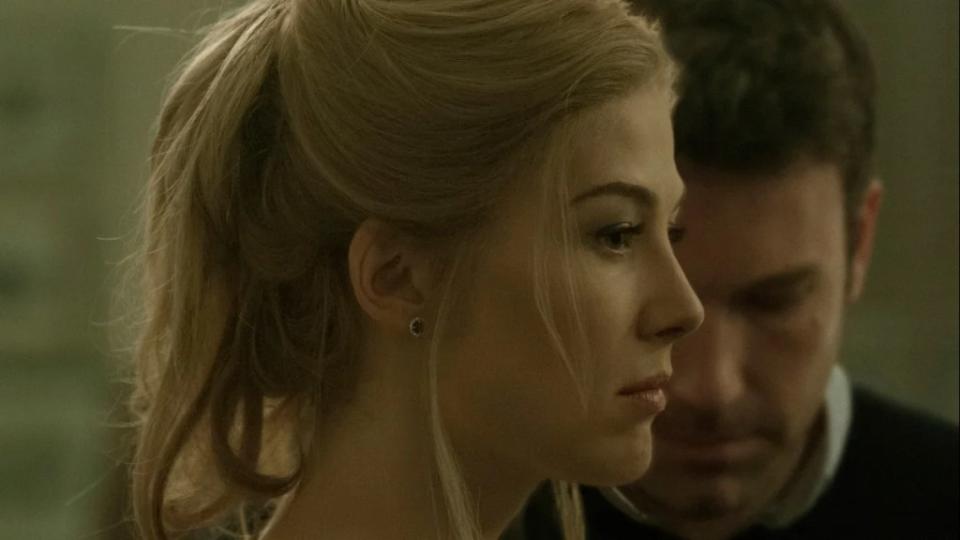
5. “Gone Girl” (2014)
For David Fincher’s adaptation of Gillian Flynn’s bestselling novel “Gone Girl,” he presented Reznor and Ross with a very specific example of what the music should sound like. “Here’s what happened. David was at the chiropractor and heard this music that was inauthentically trying to make him feel OK, and that became a perfect metaphor for this film,” Reznor told USA Today at the time of the film’s release. “The challenge was simply, what is the musical equivalent of the same sort of facade of comfort and a feeling of insincerity that that music represented?”
Carving out two-week stretches during a lengthy Nine Inch Nails tour, Reznor and Ross tackled this sensation head-on – you can hear it in the vaguely New Age-y music that accompanies the title sequence over spaces that seem both banal and almost haunted and, in the way that a mundane moment can curdle into something nightmarish. The cue that accompanies Neil Patrick Harris’ bloody murder is full-on industrial hell. There’s so much irony in the music, too, in the way that Reznor and Ross recirculate a theme, first used when Rosamund Pike is describing the fairy tale early days of her marriage, but this time when she has returned home, revealing herself to be a scheming, sociopathic monster. They put even more twinkle on the cue when it comes back, the grimmest ending to the fairy tale imaginable.
Essential track: “Sugar Storm“
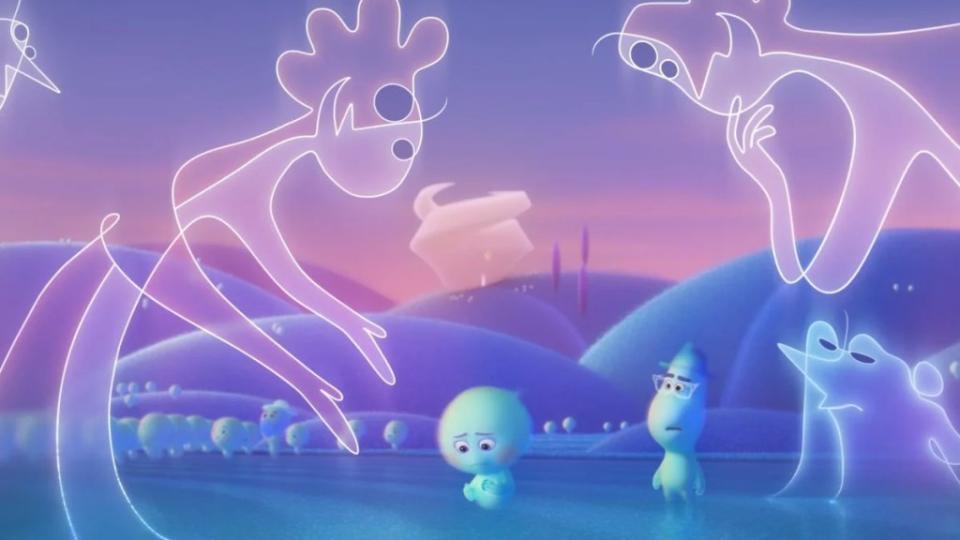
4. “Soul” (2020)
In that same GQ interview, Ross said that they had made a list of dream collaborators. And Pixar was on that list. “I think the moviemaking pedigree of Pixar is incredible,” Reznor said. They were intrigued by the movie’s concept, in which the lead character (voiced by Jamie Foxx) seemingly dies in the first ten minutes. Initially, they wrestled with the assignment, coming up with music that they thought “sounded” like a Pixar movie without really giving over to the process and remaining true to who they were as artists. “We screwed it up by psychologically freaking ourselves out,” Reznor told GQ. They toiled away for months. “I remember a Friday night, I said, ‘This shit sucks. Everything we’ve done sucks.’ This isn’t us. And it’s not good.” After that “awakening,” they started the next Monday and everything was fixed.
What resulted from the epiphany is some of their most compelling music ever, as they scored the film’s version of the afterlife, utilizing uplifting electronic elements that never come across as cloying or insincere. They also wrote “Just Us,” which accompanies a moment towards the end of the film that is so powerful, so full of emotion that just thinking about the cue makes you well up. The score earned Reznor and Ross their second Oscar, which they shared with Jon Baptiste, who created the earthlier jazz music for the album. “Soul” remains one of Pixar’s most gorgeous, most deeply felt films and it’s impossible to imagine it without Reznor and Ross’ unforgettable score.
Essential track: “Epiphany”
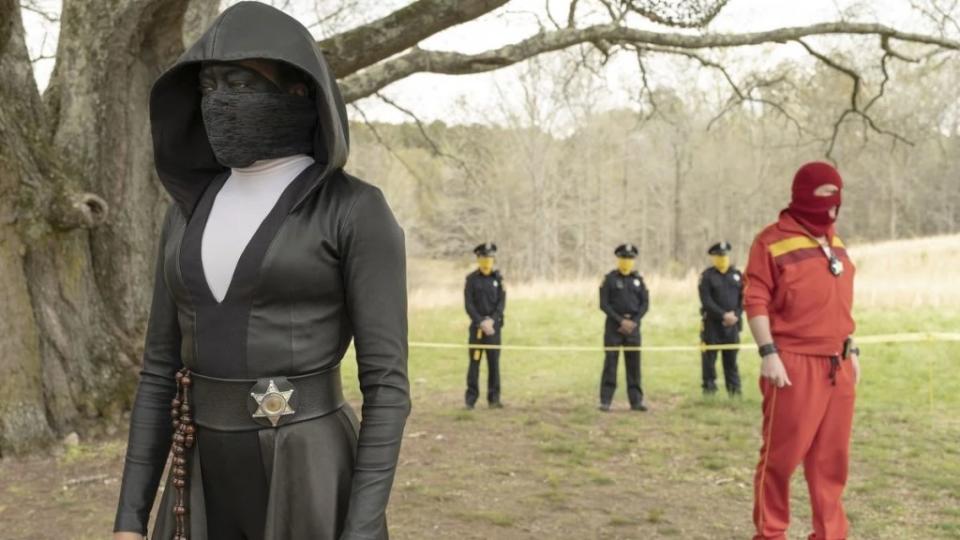
3. “Watchmen” (2019)
Another organic collaboration came about because Reznor and Ross were fans of Damon Lindelof’s work. They met the television auteur behind “Lost” and “The Leftovers” and immediately clicked. “It would be a lot easier for Damon to make something that was not called ‘Watchmen’ than it is to make something for fans that are unpleasable,” Reznor told Rolling Stone at the time. “Just taking on the IP doesn’t feel safe, so Atticus and I are all in with this show. We think it’s interesting, important storytelling — and it’s entertaining and it’s risky.” Reznor added: “They wanted something that set an aggressive, sort of sleazy tone.”
Mission: accomplished. Their muscular soundscapes set the tone for the show, which imagined where the characters and ideas from Alan Moore’s influential comic book series would be today. Police officers wear masks like superheroes. White supremacists are using Rorschach’s journal as their personal call to arms. And the fantastical, fascistic 1980s of the comic books have continued on. You can hear it in the unnerving chords and use of vintage synths. (And when Reznor and Ross had to dip back further in time, they handled it with aplomb.)
“’Watchmen’ meant a lot to me and it meant a lot to Trent,” Ross said in the GQ interview. Part of what made the whole “Watchmen” era so fun, too, was that the composers released three soundtrack albums, each with in-universe material relating to the world of “Watchmen” that was compiled and written by the show’s writers and researchers. It further fleshed out the alternate reality history of the show. And it further established the music as a profound building block of the series. They won the Emmy for Outstanding Music Composition for a Limited Series for their exceptional work.
Essential track: “Seven Years Bad Luck“
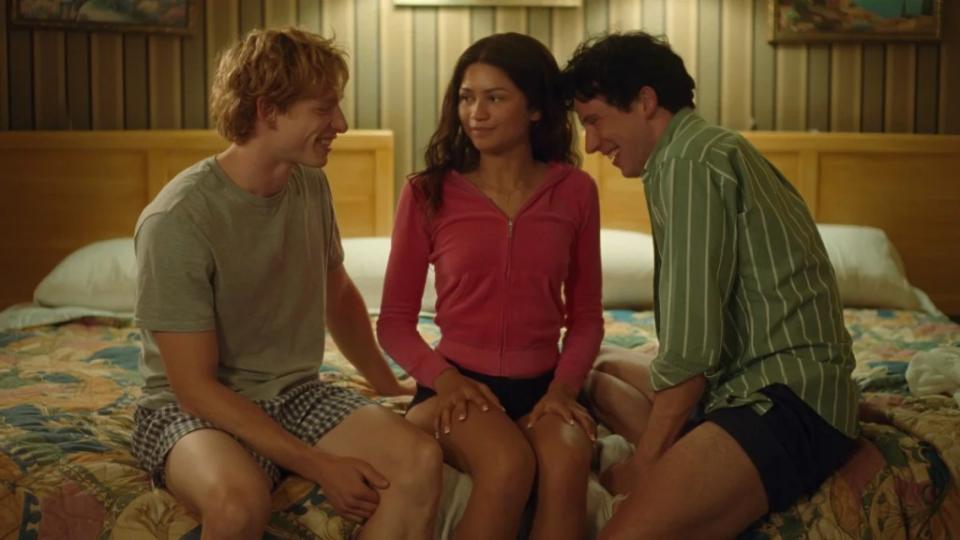
2. “Challengers” (2024)
Reznor and Ross re-teamed with Guadagnino for “Challengers,” a relationship drama set within the world of professional tennis. But instead of the folksy heartland balladeering of “Bones and All,” he asked them to do something very different. “He wanted full-on dance music all the way through,” Ross told GQ. Reznor recalls that the filmmaker told them that he wanted viewers to almost be able to “dance to the movie.” That’s quite a directive for the composers, who can luxuriate in mood and atmosphere as much as are able to create propulsive, beat-heavy cues. But they knocked it out of the park (not to mix sports metaphors but here we are).
What makes the score really impactful, too, is that the music – which could (and probably should) be played in the club – doesn’t just underline moments of on-the-court intensity, but it fills up scenes in which two people are talking in a room just as easily. It adds a level of complexity to the movie, turning every moment, no matter how subtle, into a sweaty rave of bruised emotions and hypersensitivity. Watching the movie, you can feel the music and the way that it’s impacting the audience. It’s the best score they’ve done since their debut, with a bitching new Nine Inch Nails song featuring lyrics co-written by Guadagnino. And it’s proof that as artists and as composers, they’re just getting started. Who knows what their next breakthrough will be.
Essential track: “Compress/Repress“
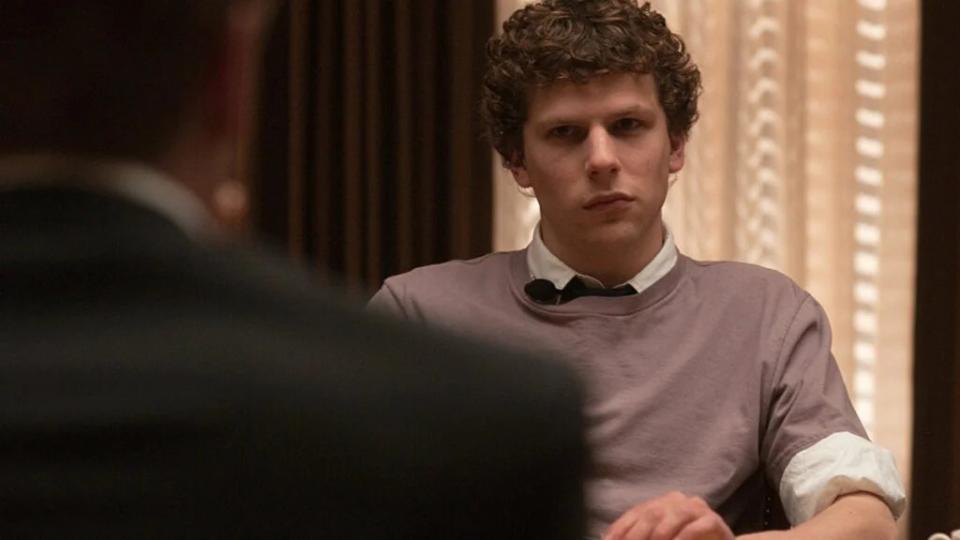
1. “The Social Network” (2010)
When David Fincher first approached Reznor about composing the score for “The Social Network,” the musician brushed him off. He was exhausted from touring and interested in working on other things. But when he read the script, he and Ross signed on officially. It probably helped that Fincher was using Reznor and Ross’ instrumental Nine Inch Nails “Ghosts” project as temp music for the movie (two tracks – “14 Ghosts II” and “35 Ghosts IV” actually made it into the score).
Not that it made the process any easier. An early cut of the movie featured a college rock song over the credits that Reznor said gave it “this John Hughes vibe” according to an interview he did with Pitchfork at the time. Reznor and Ross worked up sketches and sent them to Fincher, who was floored. The filmmaker only gave them a specific note about one cue – their interpretation of “In the Hall of the Mountain King,” which accompanies a climactic rowing match – should have shades of Wendy Carlos. Reznor connected to the material, having been a selfish, narcissistic egomaniac in the past, and the composers gave the music a complexity, relaying the psychological and emotional complexity of the man who would invent Facebook.
At the time, nobody had heard anything like it, a thrilling mixture of electronic music and deeply felt atmosphere. In the years since Reznor and Ross unleashed their masterpiece, it would have been easy for them to fall back on the same tropes, recycling and repeating themselves like some composers (even the very best ones) are prone to do. But their creative partnership, and their willingness to work on other projects that stretch their creativity (like their upcoming With Teeth company), insures restlessness and experimentation. They are constantly on the hunt, a couple of sharks, dressed all in black, cutting through the water.
Essential track: “In Motion“
The post Every Trent Reznor and Atticus Ross Score, Ranked appeared first on TheWrap.

